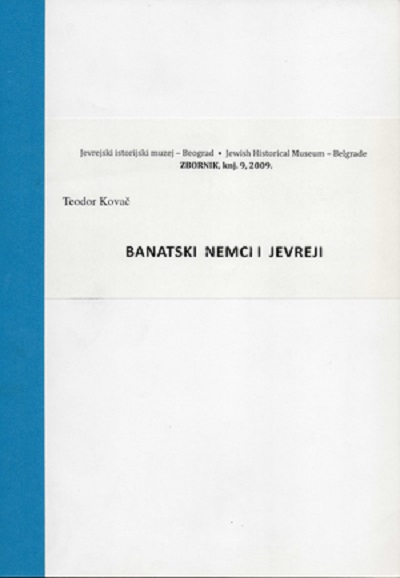Приказ основних података о документу
Banatski Nemci i Jevreji
Germans and Jews in Banat
| dc.creator | Kovač, Teodor | |
| dc.date.accessioned | 2019-12-28T09:44:56Z | |
| dc.date.available | 2019-12-28T09:44:56Z | |
| dc.date.issued | 209 | |
| dc.identifier.issn | 0353-0612 | |
| dc.identifier.uri | https://www.jevrejskadigitalnabiblioteka.rs/handle/123456789/202 | |
| dc.description.abstract | Posle Aprilskog rata okupacijom Banata život tamošnjih Jevreja drastično se izmenio zbog odnosa banatskih folksdojčera prema njima. Prošlo je svega 4 meseca okupacije kada su svi Jevreji Banata uz punu podršku folksdojčera internirani, deportovani u Beograd i muškarci do sredine oktobra te godine a žene do maja 1942. ubijeni. Time je Banat faktički postao prvi administrativni entitet u Evropi bez Jevreja. | sr |
| dc.description.abstract | This paper was written relying on data from different monographs, encyclopedias, studies, periodicals and, to a lesser degree, relying on research by the author. The purpose of the paper was to integrate these different data in one paper. The settlement of Germans in the region of Banat started around the mid XVIII century when, after the Požarevac Treaty, this region came under the rule of the Vienna Court. The Court soon realized that in this region, due to the low population density of the border to the Ottoman Empire, the Monarchy was weak. It later became obvious that this region could be the crops growing region that could feed the whole state and this was one reason more to enhance settlement in Banat, predominantly by Germans, mostly from southern parts of Germany. Banat at that time was a swampy region and the rivers flooded great territories, and after through irrigation it was made suitable for settlement, the Germans became an important part of its population. Over the subsequent decades, Germans greatly contributed to the economic development of Banat and they became economically stronger. The relations between Germans and Jews were correct ones, without any major mixing, until the Nazis came to power in Germany. The Jews probably lived in this region already during the time when Banat was within the Roman Empire. This can be concluded from the sites in the vicinity, in Solin (near Split), Duklja (near Podgorica), Stobi (near Skopje). A lot of material was found in Čelarevo (Bačka) with Jewish symbols, probably from the time of migrations of people. During the Middle Ages, the links between the Jews from Spain and Khazars went through this region. When the Austrian army, after having expelled the Turks, entered Timisoara, it found there a major Jewish community. Since the arrival of Turks in Banat during the XVI century, there were always Jews in Banat, until the time of their extinction in 1941. Gradually, the number of Jews increased, so that after the April war the number of domiciled Jews in Banat was about 7,200. In any case, the Jews lived in Banat much earlier than Germans. With the disintegration of the dual monarchy after the WWI and after Banat entered a new state, the relations between Germans and Jews remained the same as before. The situation changed significantly with the rise of Nazis to power in Germany. The umbrella organization of Germans in the newly established state was the Kulturbund, which soon became the extended arm of the Nazi state, during which German youth went to Germany to "study" and to "get qualifications", thus avoiding their military duty in the country in which they lived, and joined the SS. In Vršac, there was a spy radio-station "Nora". When Banat was occupied in April 1941, all power was taken by the local German population, and literally, as of the first day of the entry of the German army, the local German population began to humiliate, arrest, torture and rob the Jewish population. The treatment of Jews, in places populated mostly by Germans, was often horrible. Although formally under the authorities of Belgrade, the Banat Germans considered themselves practically independent of the civilian authorities of Belgrade. Banat had a greater degree of independence than, for instance, the "Independent State of Croatia". They were very proud of the fact that on 14 August all Jews from Banat were in internation camps and gradually, during the following five weeks, all were deported, with the exception of 43 Jewish women married to Christians. After the deportation, there were no more Jews in Banat, except for a small group of prisoners in Zrenjanin, and the paper provides details of this. The Banat Germans were very proud that practically on their own they carried out the internation and deportation and thus, to their joy and pride, made Banat practically the first entity in Europe that was "cleansed of Jews" (Judenrein). Thus Banat became the first entity in Europe with no more Jews, with the exception of the mentioned women. Banat was not only the part of former Yugoslavia with the greatest number of victims in this respect, but also, regretfully, the first one in occupied Europe. The property looted from the Jews at the time of their leaving Banat was divided among the local German population, who never even attempted to assist, for instance, in the reconstruction of destroyed synagogues, cemeteries or other Jewish property. In the publications published by Banat Germans and their heirs abroad, there is no mention of apology for what they had done to their Jewish neighbors before their internation and deportation. The past sixty-plus years were obviously not enough for them to admit how they had treated the Jews. The fact that there were also innocent victims among them is no excuse for their actions. | en |
| dc.language.iso | sr | sr |
| dc.publisher | Beograd : Savez jevrejskih opština Jugoslavije [Federation of Jewish Communitues in Jugoslavia] | sr |
| dc.rights | openAccess | sr |
| dc.rights.uri | https://creativecommons.org/licenses/by-nc-nd/4.0/ | |
| dc.source | Zbornik 9 : Studije, arhivska i memoarska građa, Jevrejski istorijski muzej - Beograd = Jewish studies 9 : Studies, archival and memorial materials, Jewish historical museum - Belgrade | sr |
| dc.subject | Banatski Nemci | sr |
| dc.subject | Jevreji - internerniranje | sr |
| dc.subject | Jevreji - Banatski Nemci | sr |
| dc.subject | Banatski Nemci | sr |
| dc.subject | Jevreji - deportovanje | sr |
| dc.subject | logor Topovske šupe | sr |
| dc.subject | Sajmište, logor | sr |
| dc.subject | Holokaust | sr |
| dc.subject | Banat Germans | sr |
| dc.subject | Jews - internation | sr |
| dc.subject | Jews - Banat Germans | sr |
| dc.subject | Holocaust | sr |
| dc.title | Banatski Nemci i Jevreji | sr |
| dc.title | Germans and Jews in Banat | en |
| dc.type | article | sr |
| dc.rights.license | BY-NC-ND | sr |
| dcterms.abstract | Ковач, Теодор; Банатски Немци и Јевреји; Банатски Немци и Јевреји; | |
| dc.rights.holder | Savez jevrejskih opština Srbije = Federation of Jewish Communities of Serbia | sr |
| dc.identifier.fulltext | http://jevrejskadigitalnabiblioteka.rs/bitstream/id/459/JIM0902TEODORKOVACBANATSKINEMCIIJEVREJI.pdf | |
| dc.type.version | publishedVersion | sr |
| dc.citation.spage | 23 | |
| dc.citation.epage | 88 | |
| dc.citation.issue | 9 | |
| dc.description.other | Članak je štampan i kao separat (the article was also printed as a separate issue). | |
| dc.identifier.rcub | https://hdl.handle.net/21.15107/rcub_jdb_202 |
Документи
Овај документ се појављује у следећим колекцијама
-
Istorija - Srbija [History - Serbia]
-
Holokaust u Srbiji [Holocaust in Serbia]
-
Zbornik JIM 09 [Jewish Studies JHM 09]
Studije, arhivska i memoarska građa o Jevrejima Jugoslavije / Studies, archival and memorial materials about the Jews in Yugoslavia -
Holokaust u Jugoslaviji [Holocaust in Yugoslavia]
-
Istorija - Jugoslavija [History - Yugoslavia]

